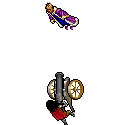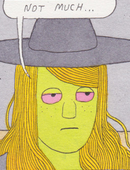|
Him?
|
|
|
|

|
| # ? May 23, 2024 09:22 |
|
HIJK posted:That's why these books feel like a DnD campaign, he's just describing what people are doing in cinematic terms which is how you get poo poo like "a grin that was nothing like a smile" or whatever. If I was in a DnD campaign that was this boring and involved creepy fairy-sex I would leave.
|
|
|
|
PJOmega posted:Hey, Bridge 4 (5?) had plenty of character development. The people who ran it? Less so. I want Shen to be a PoV character.
|
|
|
|
Solice Kirsk posted:Him? He's really funny.
|
|
|
|
Well let's hope so.
|
|
|
|
Evil Fluffy posted:I want Shen to be a PoV character. Chapter Title: Voidbringer Tendencies
|
|
|
|
I've been busy writing about real art this week, if anyone was wondering. But lol: quote:Since Imre was such a haven for music and drama, you might think I spent a great deal of time there, but nothing could be further from the truth. I had been there only once. Wilem and Simmon had taken me to an inn where a trio of skilled musicians played: lute, flute, and drum. I bought a short beer for ha’penny and relaxed, fully intending to enjoy an evening with my friends….
|
|
|
|
BravestOfTheLamps posted:
Yeah, except those two situations are nothing alike. It's pretty lovely to compare Kvothe desperately wanting to be part of something he's lost to a girl who isn't in a right state of mind and being taken advantage of. Or even that first situation, where he compares a mutual relationship between two people vs. a passion he develops on his own or with a group of people. I mean, what, is music suddenly going to lose interest in him and walk out or something? He just needs to be more proactive about it for him to "get it back" or whatever. edit: am I learning to read this correctly now? The writing does look shittier and shittier the closer I look at it.
|
|
|
|
Music is such a slut, messing around with those loving jocks when I'm the only one who really loves her
|
|
|
|
|
Right. Rothfuss tries to convey a really deep, really strong feeling of need there. But he uses terrible examples of other random characters instead of, say, something from the Kvothe backstory. Maybe a little tidbit from his kid life or something. That could have been nice. Nicer, in any case.
|
|
|
|
It's crazy that he manages to write about music in a way that sorta conveys that he is almost completely unfamiliar with it. Like if a deaf alien came down from deep space and tried to describe music to his deaf alien buddies.
|
|
|
|
Solice Kirsk posted:It's crazy that he manages to write about music in a way that sorta conveys that he is almost completely unfamiliar with it. Like if a deaf alien came down from deep space and tried to describe music to his deaf alien buddies. This is true. One of the scenes that I remember best is the one where he plays the difficult piece as if it's easy and the easy piece as if it's difficult. I just laughed the whole time because it was so ridiculous. I figured it was one of those things that you'd only really pick up if you have a deep background in music though?
|
|
|
|
If Rothfuss has ever played an instrument beyond beginner level I'd be stunned. He writes like a person who daydreams about how awesome it'd be if they could pull out a guitar and play his favorite songs on it at a whim. The only serious musicians who freak out when they hear music and can't be a part of it are... well none, unless they have some sort of mental issue because pretty much any talented musician is able to sit and enjoy listening to others perform. Unless it's awful, but you don't have to be a musician to be put off by badly performed music. It's just one of the (many) things Rothfuss writes about Kvothe that makes no sense unless his goal is to paint Kvothe as a completely hosed up and/or severely elitist rear end in a top hat.
|
|
|
|
Evil Fluffy posted:It's just one of the (many) things Rothfuss writes about Kvothe that makes no sense unless his goal is to paint Kvothe as a completely hosed up and/or severely elitist rear end in a top hat. Remember that Kvothe grew up around musicians, and then when they were all brutally murdered he used music as a coping mechanism for depression and insanity. He quite clearly has an unhealthy level of attachment to the ability to make music.
|
|
|
|
jivjov posted:Remember that Kvothe grew up around musicians, and then when they were all brutally murdered he used music as a coping mechanism for depression and insanity. He quite clearly has an unhealthy level of attachment to the ability to make music. But this is not how a traumatized musician would react to hearing music after making traumatic associations with it. It just doesn't quite make sense. Like this line: quote:The everyday lack of my music was like a toothache I had grown used to. I could live with it. But having what I wanted dangled in front of me was more than I could bear. This is the reaction someone has to not having access to their iPod. This someone who passively listens to music and wants to listen to it all the time. A mindless consumer, an aural glutton. Musicians can make their own music wherever they go, even if it's just humming. In fact a musician will likely be a person who constantly taps rhythms, hums songs, recalls lyrics out of no where, and actively seeks out other musicians to learn from them. (Source: I've been a singer for 15 years and I do all of this.) If Kvothe was as musically literate as Rothfuss wants him to be then music would be something he makes as an unconscious act. If you've been raised on it, as a child, then it's a part of you and you don't just stop making music because you're traumatized. It's totally internalized, music ceases to be a product you make and becomes something that lives inside your bones. You can't stop doing music just because your parents died. It would be impossible. Music lives inside you, it takes you over, it grows inside you like a tree, even if you don't take care of it. You inhale music and breathe it out. The only conclusion I can draw from this is that Rothfuss is a musical illiterate that thinks listening to an mp3 player is any way comparable to the act of making music. It isn't. HIJK fucked around with this message at 02:41 on Apr 30, 2016 |
|
|
|
jivjov posted:Remember that Kvothe grew up around musicians, and then when they were all brutally murdered he used music as a coping mechanism for depression and insanity. He quite clearly has an unhealthy level of attachment to the ability to make music. Even if he used it as a coping mechanism he didn't keep up with it and he sure as hell doesn't regularly have that sort of reaction to music he can't be a part of. I played an instrument as a little kid and continued up through college. I haven't played for years and I still do things such as tap out music like HIJK mentioned. His reaction about not being able to be a part of music is impossible for someone of his supposed skill level. Rothfuss's writing in regards to music is terrible and almost as bad as his poetry.
|
|
|
|
Evil Fluffy posted:Even if he used it as a coping mechanism he didn't keep up with it and he sure as hell doesn't regularly have that sort of reaction to music he can't be a part of. I played an instrument as a little kid and continued up through college. I haven't played for years and I still do things such as tap out music like HIJK mentioned. His reaction about not being able to be a part of music is impossible for someone of his supposed skill level. Kvothe is a musical prodigy. He found the "sad" note.
|
|
|
|
The music poo poo makes a lot more sense when you keep in mind that Kvothe is Rothfuss's D&D bard and any music he would have played would've been done by announcing "I play a mournful dirge on my pan flute" and rolling a d20 to see just how mournful it is
|
|
|
|
|
Evil Fluffy posted:Even if he used it as a coping mechanism he didn't keep up with it and he sure as hell doesn't regularly have that sort of reaction to music he can't be a part of. I played an instrument as a little kid and continued up through college. I haven't played for years and I still do things such as tap out music like HIJK mentioned. His reaction about not being able to be a part of music is impossible for someone of his supposed skill level. And we all know how he feels about poetry! Rothfuss has admitted on his blog that he has no musical ability or aptitude. It explains a lot about why he understands it so poorly. If he wrote what he knew from experience, Kvothe would be Manet, staying years at a college without graduating because of complacency and lack of desire to progress.
|
|
|
TheIncredulousHulk posted:The music poo poo makes a lot more sense when you keep in mind that Kvothe is Rothfuss's D&D bard and any music he would have played would've been done by announcing "I play a mournful dirge on my pan flute" and rolling a d20 to see just how mournful it is
|
|
|
|
|
It was a Move Silently check in three parts.
|
|
|
|
LET’S READ THE KINGKILLER CHRONICLE CRITICALLY Part 21: “She shrugged easily.” In Chapter 47, “Barbs,” Kvothe summarizes his first few months or so in the University. He makes a little money, becomes friends with the interchangeable Wilem and Simmon, and he and Ambrose get into spats. He also begins to cultivate his growing notoriety by spreading rumours about himself. Kvothe continues to have spats with Ambrose, and notes that he was underestimating him. quote:You see, my dramatic entrance to the University had made quite a stir. I’d made my way into the Arcanum in three days instead of the usual three terms. I was the youngest member by almost two years. I had openly defied one of the masters in front of his own class and avoided expulsion. When whipped, I hadn’t cried out or bled. There’s nothing particularly comic about Kvothe’s spreading of rumours, let alone satirical. One yearns for Baudolino and company fabricating the kingdom of Prester John and adding whatever they thought was cool at the time: Baudolino posted:For the rest, they had only to repeat what had been thought and said in previous years, with some embellishments. The land of Prester John dripped honey and was brimming with milk—and Rabbi Solomon was delighted to find echoes of Exodus, Leviticus, Deuteronomy—the land knew neither serpents nor scorpions, the river Physon flowed there, which emerges directly from the Earthly Paradise, and in the land were found ... stones and sand, Kyot suggested. No, Rabbi Solomon replied, that's the Sambatyon. Shouldn't we put the Sambatyon in here, too? Yes, but later. The Physon flows from the Earthly Paradise and therefore contains ... emeralds, topazes, carbuncles, sapphires, chrysolite, onyx, beryls, amethysts, Kyot contributed. He had just arrived and didn't understand why his friends displayed signs of nausea. (If you give me one more topaz I'll swallow it, then poo poo it out the window, Baudolino cried.) By now, with the countless blest islands and paradises they had visited in the course of their research, they were all fed up with precious stones. Chapter 48, “Interlude—Silence of a Dfferent Kind” returns to the present briefly, and is abruptly from Bast’s point of view until dialogue begins. Bast is afraid of the silence surrounding Kvothe. This of course contradicts the text, which is mostly about Kvothe speaking. He isn’t even silent with Bast, so this passage is nonsensical when it’s followed by self-aggrandizing. quote:A year ago he had been fearless as any sane man can hope to be, but now Bast feared silence. Not the ordinary silence that came from a simple absence of things moving about and making noise. Bast feared the deep, weary silence that gathered around his master at times, like an invisible shroud. quote:Kvothe had a bite or two before he spoke. “Onward then. Music and magic. Triumph and folly. Think now. What does our story need? What vital element is it lacking?” In Chapter 49, “The Nature of Wild Things,” Kvothe continues this theme with an aside about how the woman he loved was a wild thing who must be approached carefully: quote:As with all truly wild things, care is necessary in approaching them. Stealth is useless. Wild things recognize stealth for what it is, a lie and a trap. While wild things might play games of stealth, and in doing so may even occasionally fall prey to stealth, they are never truly caught by it. At the beginning of every term, students at the University must go through admissions again to determine their tuition fee. This is all summarised rather briefly. During Kvothe’s examination, Hemme pursues his grudge against Kvothe, and as a result the tuition fee is more than Kvothe can afford. He doesn’t want to borrow money from his friends, and he’s hiding his poverty from them anyways, he can’t get credit from the respectable moneylenders, and pickpocketing is too risky since he would be expelled at best. He resolves to find a moneylender “for desperate people,” or a loan shark to put it bluntly. Predatory moneylenders have a made-up fantasy name, “gaelet,” because “moneylender” is apparently too prosaic for this subversive fantasy epic. This will take him to Imre, the town near the University, and this for some reason deserves a chapter break. In Chapter 50, “Negotiations,” Kvothe heads to Imre, and describes its culture. It’s proximity to the “governing hub of the Commonwealth,” Tarbean, and the University make it an affluent town. Many potentates with interests in Tarbean actually live in Imre, since it’s just two days of travel away. It’s still not explained why the Inquisition does nothing about the University, by the way. It’s also a centre of arts and music, which is distressing to Kvothe: quote:Since Imre was such a haven for music and drama, you might think I spent a great deal of time there, but nothing could be further from the truth. I had been there only once. Wilem and Simmon had taken me to an inn where a trio of skilled musicians played: lute, flute, and drum. I bought a short beer for ha’penny and relaxed, fully intending to enjoy an evening with my friends…. I promised myself I wouldn’t simply turn this into a riffing session, but passages like this tempt me. I could just post a smiley and be done with it. The image is compelling enough, but it’s more off-putting than anything, partly because of the anachronism. The passage is shocking after the volume of tepid description, which qualifies it as effective at least. But two problems are clear: First, Kvothe’s association of music and instruments with a (defiled) female body is off-putting as opposed to insightful, since it’s not used very little for narrative. It’s also odd since teen Kvothe has been basically asexual up to this point, even his interactions with Denna was quite chaste. How does this relate to him being raped in Tarbean? Rothfuss explores mature subjects, but the story’s essays into sexuality are clumsy to say the least. Second, that’s not how anyone yearns for music. After these psychosexual musings, Kvothe arrives at the door of Devi the moneylender: quote:A gaelet would simply have you beaten, or robbed, or both. This was not smart. I was playing with fire. Devi is amiable, but is not willing to lend just the trifle Kvothe needs. She will only led four talents. Kvothe’s fiscal troubles will occupy many pages, but for the moment we have  a story element that employs the fantastical a story element that employs the fantastical  quote:“Okay,” I said, resigned. “Where do I sign?” In the end it’s rather tepid, even if leads to the most interesting conflict in the second book. Consider that this is the same motif as the "pound of flesh" from Merchant of Venice, but there's barely any horror or tension to it, even in the next book. She's a bloodsucking moneylender, but the narrative will not go anywhere with this. Kvothe declines for the moment, but he has to get the money for tomorrow, and intends to get it from his friends. But he happens to pass by a pawnshop which he happens to enter. He asks for a suitable lute, and when handed one he covertly un-tunes it so he haggle down the price. quote:To all appearances I held the lute casually, carelessly. But in my heart I was clutching it with a white-knuckled fierceness. I cannot hope for you to understand this. When the Chandrian killed my troupe, they destroyed every piece of family and home I had ever known. But in some ways it had been worse when my father’s lute was broken in Tarbean. It had been like losing a limb, an eye, a vital organ. Without my music, I had wandered Tarbean for years, half-alive, like a crippled veteran or one of the walking dead. He buys the lute with his meagre savings, and returns to Devi to borrow four talents. Alongside Lorren, Devi is by default one of the most interesting figures of the book. Kvothe has that problem of Mary Sue characters that everyone either loves or hates him immediately. So the ones that don’t fit this scheme end up being interesting anomalies. quote:I needed the tips of my fingers intact, so I pricked the back of my hand and let three drops of blood slowly gather and fall into the small brown bottle. I held it out to Devi. JUST ROTHFUSS THINGS quote:I learned things of a less academic nature as well. Some of my Arcanum bunkmates taught me a card game called dogsbreath. I returned the favor by giving an impromptu lesson in psychology, probability, and manual dexterity. I won almost two whole talents before they stopped inviting me back to their games. ROTHFUSSIAN ANACHRONISMS quote:Imre was a haven for the arts. There were musicians, dramatists, sculptors, dancers, and the practitioners of a hundred other smaller arts, even the lowest art of all: poetry. Performers came because Imre offered what every artist needs most—an appreciative, affluent audience. This is a bizarre attitude in a pre-modern oral culture, but it’s not actually the first such instance: quote:My father stood for a second or two looking off into space and tugging at his lower lip. Finally he shook his head. “Can’t remember the end of that last line. Lord but I dislike poetry. How can anyone remember words that aren’t put to music?” His forehead creased with concentration as he mouthed the words silently to himself. Poetry employs things like meter and rhythm that make it musical. The word “lyric” even originates from poetry: Ancient Greek sang or recited lyric poetry accompanied by a lyre. It doesn’t make sense even in the narrative, since Kvothe and his father come from a theatrical background where they acted out plays in verse. I suppose it’s an ironic jab, but it’s a strange attitude considering how much the genre owes to poetry. BravestOfTheLamps fucked around with this message at 01:58 on Jan 10, 2017 |
|
|
|
The weird hatred of poetry only contributes to the overall vibe that Kvothe is just a modern 20-something nerdy dude from a middle class background stuck in a fantasy setting. It doesn't make sense for the setting or for the character's background as a performer. Doesn't Ambrose recite poetry at some point and Kvothe has another snarky thing about how much he hates it? I can't remember this part of the book very well, partly because it's been a year since I read it and partly because Ambrose is just such a boring, dull antagonist. We're supposed to hate him for being an smug aristocrat even though Kvothe is equally as elitist about everyone and everything he encounters.
|
|
|
|
Shakespeare's greatest ambition as an artist was to be recognized as a poet of merit. His plays were his business, one of the ways he earned a living. The fact that they're recognized as some of the greatest works in the English language owes to his incredible skill as a poet. A musician would have an even higher opinion of poetry, particularly a lyricist. I'm not sure it even makes sense from a worldbuilding standpoint that a troupe of well-educated traveling entertainers would express a dislike of poetry as an art form. You could get the same effect by having Kvothe be really snooty and picky about what he considers to be good poetry, and it would make sense to look down on someone for liking hokey or halfassed poetry (as he sorta does in the first Ambrose meeting), but hating poetry itself makes no sense for Kvothe or for his father.
|
|
|
|
I never bothered exposing myself to much fantasy so I dunno if this is typical in the lower rungs of the genre, but Kvothe is really loving unlikable, good grief. Drizzt Do'Urden might have been functionally invincible but from what I can remember from his books I've read (over fifteen years ago) at least the guy kept an open mind about things.
|
|
|
|
Oxxidation posted:I never bothered exposing myself to much fantasy so I dunno if this is typical in the lower rungs of the genre, but Kvothe is really loving unlikable, good grief. Most genre fantasy is in third person. This insulates the author from a direct association with the thoughts of the characters and to some extent allows the blame for being unlikable at the feet of the specific character that annoys the reader. But it can also isolate the reader from realizing what an unrealistic dick a character is, because they're not always getting a sense of what the character is thinking. And a bad writer can also use this to disguise the fact that they're compelling a character to do something that doesn't really make any sense or isn't motivated by anything. Kvothe can't just go to Imre in a first-person narrative because he needs to have an actual reason to be there, since he's relating his own thoughts and history. Kvothe being unlikable just comes down on whether you think he was supposed to be unlikable. Since he's narrating this himself in his own future we'd probably expect some kind of narrative wink or outright recognition that past-himself was an immature prick.
|
|
|
|
Minor detail out of all of this crap, but:quote:The everyday lack of my music was like a toothache I had grown used to. I could live with it.
|
|
|
|
Ohvee posted:Minor detail out of all of this crap, but: Errrr, people normalize pains all the time, including toothaches.
|
|
|
|
Yeah; depends on the type/cause of toothache.
|
|
|
|
Yeah, Kvothe's weird-rear end hatred of poetry really soured me on the guy, I'm not going to lie. Which may have been the intention, to have him still have shades of being an elitist prick? Also jivjov, (and I'm being honest here, because I do like you; you're a pure soul), do me a favour and pick up Gene Wolfe's Book of the New Sun, it's a fraction of the length of one of Rothfuss' book and it completely blows it out of the water: Wolfe can do in six pages what Rothfuss takes a hundred to do, I garuntee.
|
|
|
|
Yeah, but pure what?
|
|
|
|
Kvothe's attitude toward poetry is the same one that every Intro to Creative Writing student who signed up to get asspats for their bad fiction has when the TA tells them it's part of the curriculum
TheIncredulousHulk fucked around with this message at 19:13 on May 1, 2016 |
|
|
|
|
ManlyGrunting posted:Yeah, Kvothe's weird-rear end hatred of poetry really soured me on the guy, I'm not going to lie. Which may have been the intention, to have him still have shades of being an elitist prick? What, are you Anna Stubblefield?
|
|
|
|
Does he ever change his mind about that or are you supposed to assume it's the character's bias and a personal flaw? Seems weird for a student of name/word magic to dismiss poetry.
|
|
|
|
Ague Proof posted:Does he ever change his mind about that or are you supposed to assume it's the character's bias and a personal flaw? Seems weird for a student of name/word magic to dismiss poetry. He never changes his mind about it, but there's no indication that we're meant to see it as a personal flaw either. That is to say, it is a personal flaw, but it's Rothfuss's flaw, not Kvothe's.
|
|
|
|
Last night I had a hard time falling asleep, so I read some Whitman. "Passage to Orient". It's flawed. It's Whitman's trademark magniloquence, but brought down by some unimaginative Orientalism. Now I reading about what it really means to be poor.
|
|
|
|
My Creative Writing TA was forced to share an office with a guy who put up a Led Zeppelin "Stairway to Heaven" poster and he made sure to point out that it was not poetry when I met him during office hours.
|
|
|
|
LET’S READ THE KINGKILLER CHRONICLE CRITICALLY Part 22: “I shrugged nonchalantly...” While reading the last entry, you may have noticed that we’re through 50 chapters of The Name of the Wind, plus a short prologue. The whole book is 92 chapters, plus a short prologue and epilogue. This may sound unbelievable, but it’s true. You’ve read an (admittedly uneven) critical summary of the first 50 chapters. You will likely have noticed that barely anything has happened in terms of story. The book has plenty of incident and happenstance, but barely anything substantial. At the end, we’ll have some fun by comparing the plot structure of The Name of the Wind to some other books. Now, as for Kvothe being utterly unlikable, the problem is much more deeper than it might seem: the very structure of the prose works to make Kvothe not just unlikable, but worse, uninteresting. Earlier described Rothfuss’s prose as “plodding”. This is probably isn’t completely accurate. His prose is usually limp. Here is an illustrative example of the tone: quote:For the first time in years, I used one of the tricks Ben had taught me for calming and sharpening the mind. It was harder than I remembered, but I did it. Consider the rhythm of the first sentence. How does “I used one of the tricks Ben had taught me” sound? It’s very even. “Use” is very utilitarian when paired with “trick”. “Calming and sharpening the mind” are actually at odds, since both words have very different connotations: “calming” as a word is suitably stretched out, while “sharpening” is very harsh and, well, sharp. Paired together, the effect is indiffererent. “The mind” stops the sentence rather definitely. The whole sentence ends up being stretched out but even. Rothfuss composes every single sentence of first-person narration in the same even tones. There’s no rise or fall. Every line flows in the same rhythm, from one to next. There is never a sense of ambiguity, incompleteness, discomfort, and so on. Often he has a snappy little sentence to tie things up, like “I was a fool,” just to make sure things end on a flat note. This is how Kvothe is characterised: through self-contented prose. With 700 pages dominated by Kvothe’s ego, the effect is obscene. The evenness of Rothfuss's prose means that it reads easily but is immensely dull. This is partly why reviewers and fans can read these book yet say nothing about them. It’s easily consumed. Let’s go back to Chapter 47. You can observe yourself how even the rhythm is throughout this passage: quote:I studied in the Medica, learning more about the body and how to heal it. I practiced my Siaru with Wilem and helped him with his Aturan in exchange. It’s limp. There’s no force to it. Every sentence follows another too evenly. The prose papers over all of these hardships with a sense of self-contentment. This is what Rothfuss achieves with his prose. The next chapter is also a good example. In Chapter 51, “Tar and Tin”, Kvothe is learning the art of magic runes. He’s also found a place to practice music in a solitude: a closed-off and overgrown courtyard. While practicing, Kvothe hears the sounds of someone moving in the courtyard. He investigates and finds a large drainage grate that had caused a noise earlier. It’s covered in magic runes, which apparently keep it from being opened. Kvothe happens to be humming a song, and realises that it he can set magic runes to music. This moment of realization allows him to master sygaldry, but is running out of time to make money for Devi. Again, observe the rhythm of the prose: quote:Sygaldry, simply put, is a set of tools for channeling forces. Like sympathy made solid. There’s an even tone, and the flat note of “Lastly I was lucky. Plain and simple”. And notice again one of those transitional gaps which Rothfuss includes and which don’t make much sense when Kvothe is continuously narrating his actions. quote:Hesitantly, I curled a hand around one of the cool metal bars and pulled. The heavy grate pivoted on a hinge and came up about three inches before stopping. In the dim light I couldn’t tell why it wouldn’t go any farther. I pulled harder, but couldn’t budge it. Finally I gave up and dropped it back into place. It made a hard noise, vaguely metallic. Like someone had dropped a heavy bar of iron. Chapter 52, “Burning,” concerns Kvothe’s demanding schedule, lack of money, and a class on advanced magic. Kvothe is so busy that his friends are warning of burnout. Literally, they say “burn out”. The phrase does become rather fitting when the scene shifts into the class for advanced magic, where Master Elxa Dal has the students engage in duels. These involve the students trying to mentally light the opponent’s candle by transferring heat while keeping their own candle unlit . The students bet on these covertly so Kvothe, desperate for money, handicaps himself for a duel. This escalates when his opponents gets to choose the source of the heat they’ll transfer, which is extremely dangerous. The battle of wills ends with Kvothe barely outlasting his opponent. Kvothe wins two talents, and Master Elxa Dal offers the obligatory kindness expected from a mentor character. Kvothe’s interchangeable friends then persuade Master Kilvin to ban him from the workshop to prevent burnout. We end with a pseudo-mysterious note when Kvothe, still in need of money, asks his friends what they know about “the Eolian”. This chapter is very heavy on dialogue: quote:Elxa Dal stood between two medium sized braziers. In his well-trimmed beard and dark master’s robe, he still reminded me of the stereotypical evil magician that appears in so many bad Aturan plays. “What each of you must remember is that the sympathist is tied to flame,” he said. “We are its master and its servant.” Did you notice how Rothfuss just used the term ”medium sized braziers”? quote:Fenton grinned, knowing his advantage. “No source.” The chapter has redeeming qualities to it, since it involves Kvothe engaged in a genuine if minor struggle. But again the flaws impress more. First, a new mentor offering kindness has become formula by now, which is unforgivable in a story explicitly priding itself in its unconventionality. Second, after the duel Kvothe has to hide so that no one will see how shaken it left him, which ends up equating Kvothe’s desperation with vanity. quote:Five minutes passed with the whole class quiet as stones. Most duels lasted no longer than a minute or two, one person quickly proving himself more clever or possessed of a stronger will. Both my arms were cold now. I saw a muscle in Fenton’s neck twitch spastically, like a horse’s flank trying to shake loose a biting fly. His posture went rigid as he suppressed the urge to shiver. A wisp of smoke began to curl from the wick of my candle. quote:Actually, in the commotion that followed Fenton’s collapse I had slipped out and had a frightening few minutes in a back hallway. Shivers that were close to seizures had made it almost impossible to stay on my feet. Luckily, no one had found me shaking in the hallway, my jaw clenched so tight that I feared my teeth might break. In addition, there, the chapter contains one truly stunning passage about poverty and also serves as a good example of Rothfuss’s weak dialogue. In this case it’s the consistent anachronism of it: at times characters will speak like modern Americans. This extends from modern phrasing to characters not using titles to address each other. There is little sense of the fantasy or of historicity. Together with the absolute evenness of tone, it’s one of the many factors that make these books so damnably twee. quote:Later that night in the Mews, Wilem opened his door to my knocking. “I’ll be damned,” he said. “Two times in one day. To what do I owe the honor?” ROTHFUSSIAN WISDOM It's time for one of those passages! quote:It was true of course—I had been neglecting my friends even more than I had been neglecting myself. I felt a flush of guilt wash over me. I couldn’t tell them the full truth, that I needed to make the most of this term because it would very likely be my last. I was flat broke. As many have already pointed out, this isn’t poverty. It’s financial instability. It’s once again an example of how the story’s class criticism boils down to entitlement. BravestOfTheLamps fucked around with this message at 02:33 on Jan 16, 2017 |
|
|
|
The salt bit in that last quote is kind of weird. I think you'd be more worried about having food to begin with rather than flavoring. Salt's not even a particularly expensive commodity. I think Rothfuss heard somewhere that back in Ye Olden Days, salt was "valuable," but he never bothered to read any proper history, so he doesn't understand why. Salt was valuable because it was a great trade good: you could gather it in bulk relatively easily, you can move it around fairly easily, and you can sell it practically anywhere. But it wasn't usually something expensive or considered a luxury. If you can afford meals at all, you can probably afford salt, barring environmental constraints (I think some parts of west/central Africa had really high prices for salt in the 18th century?). Besides, Kvothe is presumably not buying salt in massive quantities so he can use it for preparing food for winter or salting his daily catch of fish. He's just cooking with it and maybe adding some to his regular meals. This is a really pedantic point to be going on about, but it's just such a dumb, bullshit detail.
Grenrow fucked around with this message at 20:38 on May 5, 2016 |
|
|
|

|
| # ? May 23, 2024 09:22 |
|
Yeah my assumption was that salt at this tech level would be used as a preservative rather than a flavoring agent, but I doubt Rothfuss gave it that much thought. Setting aside how laughable Kvothe's theme park account of poverty is in comparison to real world poverty, it doesn't even make sense when compared to Kvothe's own experiences. Dude lived homeless on the streets of brick-smashing and rape, but now suddenly real poverty is bumming drinks off your friends when you go to a restaurant and feeling embarrassed because you can afford to repair your clothes, just not in the specific color you'd want. It's like it's not even the same character talking
|
|
|
|


























